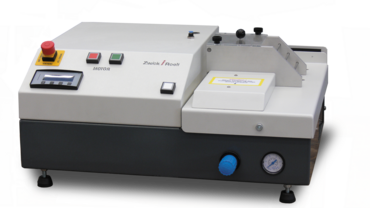ISO 3037 edge crush resistance of corrugated board (ECT)
The international standard ISO 3037 describes a method for determining the edge crush resistance of corrugated board and is applicable to all classes of corrugated board. The method is often referred to as the ECT (edge crush test). Knowledge of the ECT value is therefore important in order to assess the stackability of cardboard, to optimally adapt the packaging to the requirements of the product and to avoid damage during storage and transport.
In the ECT, a rectangular specimen of corrugated board, which is inserted between the compression platens of a compression testing machine and in which the fluting is arranged perpendicular to the surfaces of the compression platens, is loaded with increasing load to failure until the specimen breaks. The maximum force (edge crush resistance) that the specimen can withstand is measured.
The TAPPI T811 standard, which is particularly widespread in the North American paper industry, also describes the method for determining the edge compression strength (ECT) perpendicular to the flute axis for single, double, or triple-walled corrugated board.
While the ECT provides information about the material strength of the corrugated board, the box compression test (BCT) to ISO 12048 and TAPPI T804 measures the maximum load-bearing capacity of the entire box under real conditions.
Purpose of the test ECT compression test kit ECT materials testing machine More corrugated board standards Request a quotation Downloads
Purpose of the ECT to ISO 3037 and Tappi T811
- The edge crush resistance (also known as the edge crush test or ECT) to ISO 3037 or TAPPI T 811 provides information about the strength of the corrugated board when the flute is stationary and is therefore a key measure of the stability and load-bearing capacity of corrugated board boxes.It indicates how much pressure a corrugated board can withstand at its edge before it gives way. The maximum force required to crush the fluting is measured.
- The edge crush resistance is part of the McKee formula and is therefore of particular importance for quality control in corrugated board factories.
- When performing the ECT, it is important that force application to the specimen is exactly perpendicular.
- An essential requirement of the ECT is that the specimen has clean, perpendicular edges and the material must be free of existing damage. Knives are not ideal for cutting specimens and lever shears are not suitable. Good results are achieved with a twin-blade circular saw. For optimal specimen preparation, ZwickRoell offers an ECT specimen saw.
ECT compression test kit to ISO 3037 and Tappi T811
ZwickRoell offers a special compression test kit that can be operated with the zwickiLine single-column universal testing machine for performing the ECT (edge crush test)to both ISO 3037 and Tappi T811 standards.
The compression test kit is also suitable for the ring crush test (RCT) on paper and cardboard to ISO 12192 and TAPPI T822, the flat crush test (FCT) on single-faced and single-wall corrugated board to ISO 3035, EN 23035, and TAPPI T825 and the corrugated medium test (CMT) to ISO 7263-1/-2 and TAPPI T809.
Precision-guided compression platens provide extremely high lateral stiffness, ensuring reproducible determination of characteristic values.
Differentiation from other standardized test methods on corrugated board
| Short description | Standards |
|---|---|
| Paper, cardboard & corrugated board | Flexure test / stiffness under flexure (2-point, 3-point, 4-point) |
|
| Cardboard | Corrugated board | Puncture test (LPET vs. PET) |
|
| Cardboard | Corrugated board | Flat crush test (FCT) |
|
| Cardboard | Corrugated board | Edge crush resistance (ECT) |
|
| Cardboard | Corrugated board | Box compression test / stacking test (BCT) |
|


